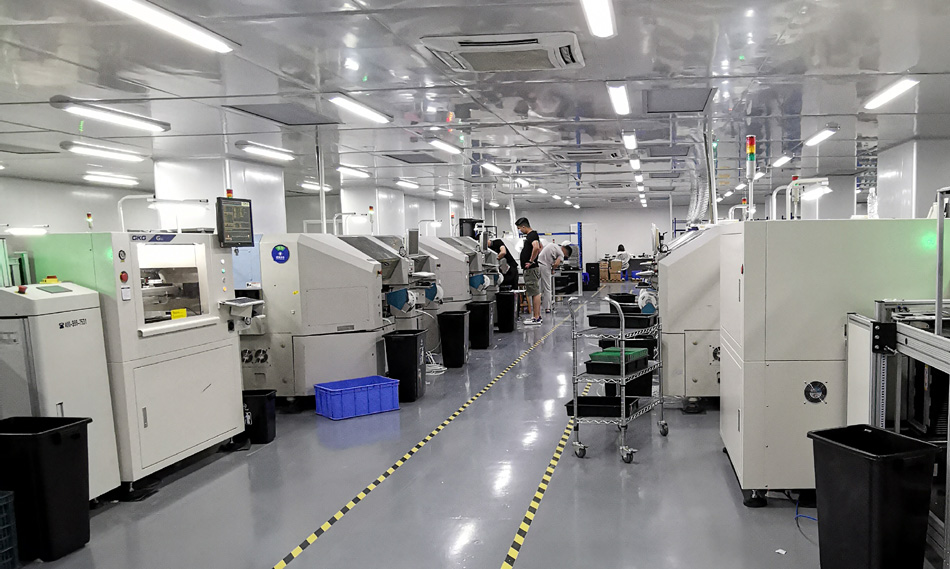- English
- Español
- Português
- русский
- Français
- 日本語
- Deutsch
- tiếng Việt
- Italiano
- Nederlands
- ภาษาไทย
- Polski
- 한국어
- Svenska
- magyar
- Malay
- বাংলা ভাষার
- Dansk
- Suomi
- हिन्दी
- Pilipino
- Türkçe
- Gaeilge
- العربية
- Indonesia
- Norsk
- تمل
- český
- ελληνικά
- український
- Javanese
- فارسی
- தமிழ்
- తెలుగు
- नेपाली
- Burmese
- български
- ລາວ
- Latine
- Қазақша
- Euskal
- Azərbaycan
- Slovenský jazyk
- Македонски
- Lietuvos
- Eesti Keel
- Română
- Slovenski
- मराठी
- Srpski језик
How do multi-functional production lines improve PCBA factories' production capacity flexibility?
In the modern electronics manufacturing industry, capacity flexibility in PCBA (Printed Circuit Board Assembly) processing has become a critical factor for manufacturers to cope with market fluctuations. With the diversification of customer demands and the accelerating pace of the market, multi-functional production lines are becoming an effective solution for PCBA factories to enhance production capacity flexibility. This article will explore how multi-functional production lines can enhance PCBA factories' production efficiency, flexibility, and resource allocation.

1. Improving Production Efficiency
Introduction of Automated Equipment
Multi-functional production lines are often equipped with advanced automated equipment, such as intelligent placement machines, automatic soldering machines, and testing equipment. These devices significantly improve production efficiency through high-speed and high-precision operation. Automated processes not only reduce the need for manual intervention but also lower production error rates, effectively increasing production capacity.
Lean Manufacturing Concepts
Multi-functional production lines are often designed incorporating lean manufacturing principles, emphasizing waste elimination and process optimization. By rationally allocating equipment and personnel, PCBA factories can achieve higher output rates while ensuring product quality. This optimized production process allows for rapid response to order changes and improves overall production efficiency.
2. Flexible Response to Market Demand
Multi-Variety, Small-Batch Production
Modern market demands for increasingly diverse products pose challenges for PCBA factories. Multi-functional production lines enable rapid switching of production modes to meet the individual needs of diverse customers. For example, when receiving small, customized orders, factories can quickly adjust production lines, reducing changeover time and achieving efficient production.
Responsive Production Planning
Multi-functional production lines also support rapid adjustments to production plans, enabling factories to flexibly respond to market changes. When order demand surges, production lines can quickly expand capacity and add shifts. When demand decreases, factories can quickly reduce production to mitigate inventory risks. This flexibility ensures PCBA factories maintain their market advantage amidst fierce competition.
3. Efficient Resource Allocation
Flexible Allocation of Personnel and Equipment
Another major advantage of multi-functional production lines is their flexible resource allocation. Factories can optimally allocate equipment and personnel based on actual order volume. For example, during peak periods, factories can increase staff and equipment utilization, while reducing resources during off-peak periods. This flexible allocation minimizes resource waste and improves overall operational efficiency.
Reduced Production Costs
By enabling efficient resource allocation, multi-functional production lines can effectively reduce production costs. When factories can quickly switch between different products, they reduce downtime caused by production changeovers and improve equipment utilization. This not only optimizes production costs but also creates greater profit margins for the factory.
4. Strengthening Product Quality Control
Integrated Quality Management
Mixed-functional production lines are often equipped with advanced quality management systems that monitor product quality in real time at every stage of production. This integrated quality management mechanism enables PCBA factories to quickly identify and resolve potential issues, thereby reducing rework and scrap rates and improving overall product quality.
Data-Driven Decision Support
Utilizing advanced production data analysis technology, PCBA factories can access real-time data from the production process and analyze the relationship between product quality and production efficiency. This data-driven decision support helps factories achieve continuous improvement throughout the production process, thereby enhancing their market competitiveness.
Conclusion
Mixed-functional production lines provide PCBA factories with a flexible and efficient production solution. By improving production efficiency, flexibly responding to market demand, efficiently allocating resources, and strengthening product quality control, PCBA factories can maintain strong production capacity flexibility in the face of fierce market competition. In the future, as the electronics market continues to change, further optimizing the application of multi-functional production lines will become an important strategy for the development of PCBA factories.
Send Inquiry
-
Delivery Service






-
Payment Options









